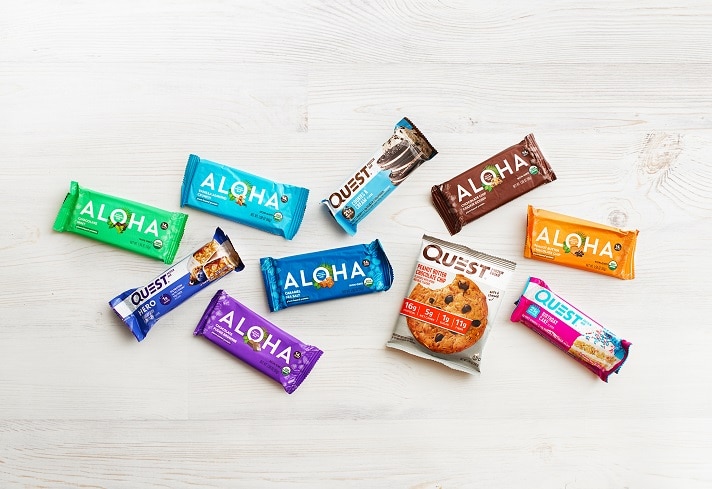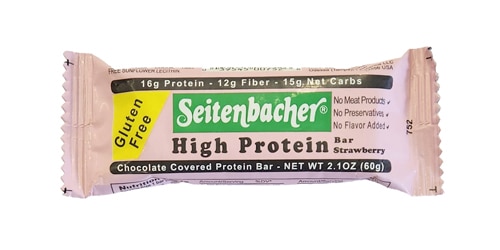There are protein bars that cater to just about every diet out there… but are they even healthy?

An easy-to-consume source of additional protein, these bars started out as go-to fuel for athletes who struggled to consume enough calories via meals throughout their day. In recent years, considering the fast-paced world we live in,
protein bars have become a staple for the average person for on-the-go breakfasts, snacks and post-workout recovery fuel.
Because of supply and demand, there are countless amounts of protein bars on the market to choose from – and trying to find the healthiest option can surely be tricky. The following information should help you feel more confident when it comes to purchasing the most nutritious and delicious protein bars.
Are protein bars healthy?
Not all protein bars are created equal. There is an increasing demand for convenience foods that drives the protein bar market. To get consumers to buy their bar, marketing teams will put a variety of phrases on the package to draw you in. Some sayings include “Eat Protein. Be Lean.”, “Protein is the Building Block for Life” or “Protein. Re-Imagined”. Yes, protein is a building block, but eating one or several protein bars does not mean you’re achieving optimal health.
The body uses protein to build and repair tissue, make enzymes and hormones and build bones, muscles, cartilage, skin and blood. It’s important to make sure you consume an adequate amount of protein per day.
How much protein do I need?
Consuming too little or too much protein can be harmful to the body. Too little protein can result in muscle wasting, brittle bones and increased appetite. Over-consuming protein can lead to kidney damage, heart disease and poor bone health. So, before picking up a protein bar, one should know how much protein they need daily.
Protein needs are based on body weight and composition, physical activity and age. Most protein bars on the shelf contain on average 8-20 grams of protein coming from egg whites, whey, casein, soy, pea and brown rice. For those looking for a vegetarian or
vegan protein bar, anything soy-based or a combination of pea and brown rice protein will ensure you receive all
nine essential amino acids. What makes these nine amino acids essential is that they must be consumed through food, as our body does not make them.
Protein bar pros
Other than essential amino acids, protein bars can be a good source of other nutrients such as fiber, vitamins and minerals. Fiber is not only beneficial for digestion, but it can help prevent overeating at meals.
- Weight-loss support
- Weight and muscle gain
- Snack or meal replacement solution
Protein bar cons
Whether you’re looking for a plant or animal-based protein bar, the amount of protein should not be the only thing to pay attention to. Some protein bars can be high in calories, added sugars and fat. Over consumption of these nutrients can increase an individual’s risk of weight gain.
- Some varieties can be expensive
- Many are made with highly processed ingredients
- Too much protein
- Certain types are made with hard-to-digest ingredients
Protein bars can be part of a healthy diet, but only a part. The majority of nutrients should come from whole foods. Whole foods are foods that have been processed or refined as little as possible and free from any additives or artificial substances.
Your body will thrive more when consuming balanced, nutrient dense meals that include all food groups. So, while protein bars may seem like a great catch-all snack or meal replacement, it’s encouraged that you’re aware of your personal protein needs. Determine your needs by scheduling a call with a
Kroger Health registered dietitian. An RD can also help you select the most optimal bar for you based on your lifestyle and offer advice for the best ways to incorporate bars into your routine.
Click here to browse healthy protein bars at Vitacost.com.
 An easy-to-consume source of additional protein, these bars started out as go-to fuel for athletes who struggled to consume enough calories via meals throughout their day. In recent years, considering the fast-paced world we live in, protein bars have become a staple for the average person for on-the-go breakfasts, snacks and post-workout recovery fuel.
Because of supply and demand, there are countless amounts of protein bars on the market to choose from – and trying to find the healthiest option can surely be tricky. The following information should help you feel more confident when it comes to purchasing the most nutritious and delicious protein bars.
An easy-to-consume source of additional protein, these bars started out as go-to fuel for athletes who struggled to consume enough calories via meals throughout their day. In recent years, considering the fast-paced world we live in, protein bars have become a staple for the average person for on-the-go breakfasts, snacks and post-workout recovery fuel.
Because of supply and demand, there are countless amounts of protein bars on the market to choose from – and trying to find the healthiest option can surely be tricky. The following information should help you feel more confident when it comes to purchasing the most nutritious and delicious protein bars.



